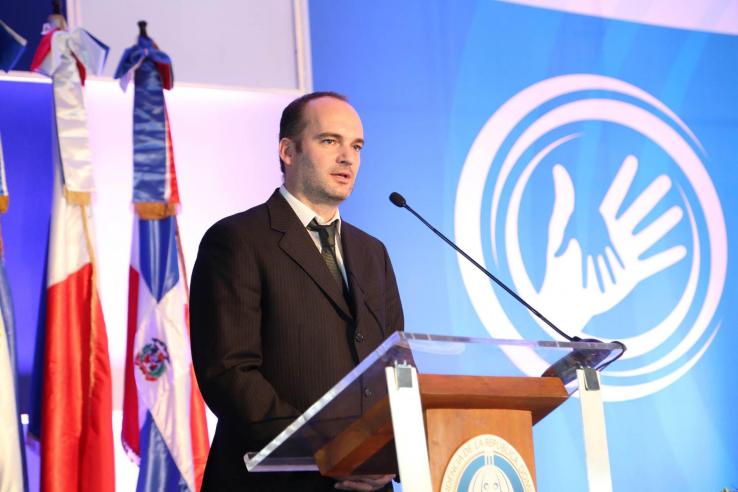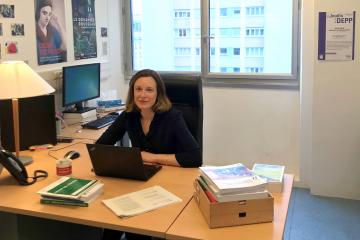
Alumni Voices from Government: Ryan Cooper ‘14, Experimental Policy Initiative, Budget Office of Chile

Formerly the executive director of J-PAL LAC, Ryan Cooper '14 now leads the Experimental Policy Initiative within Chile's Budget Office. He describes his journey from J-PAL to government in this Q&A.
Could you tell us about your current role and how you arrived at this position?
In March 2018, Chile’s President Sebastián Piñera began his administration and the new Budget Office (DIPRES) Director, Rodrigo Cerda (now the Minister of Finance), hired me to serve as Impact Evaluation Coordinator, with the objective of increasing the generation of trustworthy evidence on the cost-effectiveness of programs and policies.
There was no ongoing impact evaluation to coordinate in the Division when I arrived, which turned out to be an important opportunity to design and propose a new initiative that could potentially increase the amount and reliability of causal evidence. I later named it the Experimental Policy Initiative.
My proposal aimed at creating conditions that would enable more and better generation of causal evidence. It had the following central elements:
- Start doing in-house impact evaluations to reduce principal-agent issues that may exist between governments and investigators when the evaluation is run externally.
- Instead of hiring investigators to do the evaluations, partner with academics (as advisors) and run them together as an alliance.
- In parallel, establish an Impact Evaluation Fund for external academics to apply to with new impact evaluation ideas that we may not have thought of.
- Focus on identifying new programs that may be evaluated experimentally as pilots before they are scaled.
- Exploit as much administrative data as possible in order to reduce field work costs.
I had total backing from my superiors and from Minister Rodrigo Cerda to push the initiative forward—this institutional support was key to its success.
Currently, the Experimental Policy Initiative operates under the Department of Expenditure Revision. I am part of a great team of professionals that collaborate with national and international academics on multiple experiments (most of them at large scale). Today we are working on twelve randomized evaluations and two non-experimental evaluations related to various policy areas.
How has your experience at J-PAL informed your work today?
What influenced my work and life the most at J-PAL was the talent and positivity of my colleagues. I easily could write various pages describing how many colleagues at J-PAL have informed my personal and professional life, but given space, here I’ll just focus on a handful of them.
Francisco Gallego struck me with his kindness, compassion, and sense of justice and of duty. Working with him made me want to improve daily in various dimensions of my work and life. Rachel Glennerster was an iconic boss. The combination of her brilliance, intuition, and wisdom facilitated and enhanced my work and I feel has influenced my professional perspective permanently. I will never forget her continuous focus on people, and I will always want to be a people’s person thanks to her. I was also greatly inspired by Abhijit Banerjee’s intellectual and conceptual articulation of ideas regarding our work and mission. I was motivated by conversations with him on why policy evidence is so scarce in the world and what we should be looking at institutionally to try and solve this issue. I was also blessed by his focus on the importance of social justice.
I met many other wonderful people at J-PAL that taught and inspired me. I am immensely grateful to all of them and to J-PAL as an organization.
How do you engage with evidence generation or use in your current role, and what have you learned from this experience that you believe could inform J-PAL’s work?
Abhijit would say that ideally one should embed in government agencies and work on evidence generation from within. He was right—it’s much easier to promote scientific evidence generation from within the government, and that is exactly what I try to do in the Government of Chile. From within the Budget Office, together with a great team of investigators and staff, I promote, design and run evaluations to generate relevant causal evidence.
This has allowed me to be part of exciting research. For example, a recent experimental project where we piloted three different ways to communicate to taxpayers the annual taxes they paid and on what the tax money was spent. After confirming empirically (with a sample of 160,000 taxpayers) which method was most effective in increasing the perception of transparency and trust in the government, this method was scaled to more than 3 million people.
I think that it would be strategic for J-PAL to build and/or strengthen the capacity of in-house researchers that can push for, design, and implement RCTs from within government.
What advice would you give to someone interested in pursuing a role like yours?
I would recommend two things. First, invest significant time in studying causal inference, statistics and econometrics. Most importantly, the intuition related to the difficulty of estimating the counterfactual scenario and why experimental design can be so useful towards this objective. I recommend Josh Angrist’s online courses and books Mastering Metrics and Mostly Harmless Econometrics. Another great read is Running Randomized Evaluations by Rachel Glennerster and Causal Inference: The Mixtape by Scott Cunningham.
Second, work hard on your social and communication skills. In the social sciences, you often need to get policymakers in charge of an intervention to agree to align the design of the program’s selection process with the design of the impact evaluation. This generally involves understanding people’s incentives, goals, and fears; and being able to adapt to different social and political environments and communicate clearly what the study implies (benefits, potential risks, and ethical aspects). Being able to engage with policy partners in charge of programs, policies and interventions is very helpful in my type of job.



